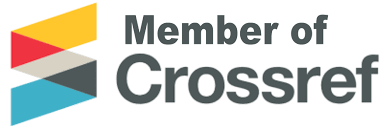Transparansi dan Akuntabiltas Pengelolaan Alokasi Dana Desa dengan Budaya Tunjuk Ajar Melayu di Desa Bukit Batu Kecamatan Bukit Batu Bengkalis
Abstract
Keywords: Transparency , Accountability, Culture, Malay  Teaching and Learning, Village Fund Allocation Management
Full Text:
PDF (Bahasa Indonesia)References
Adiwirya, Muhammad Firdiansyah. Putu Sudana. 2015. Akuntabilitas,
transparansi, dan anggaran berbasis kinerja pada satuan kerja perangkat daerah kota Denpasar. EJurnal Akuntansi 11.2 (2015): 611-628.
Alvianty.,Elfreda A Lau, dan Imam Nazarudddin Latif. 2013. Akuntabilitas Pertanggungjawaban Alokasi Dana Desa Tahun Anggaran 2013 di Desa Badak Baru.Akuntansi, Fakultas Ekonomi, Universitas 17 Agustus 1945 Samarinda: 1-7.
Andoh., Quaye, dan Akomae. 2018. Impact of fraud on ghanaian smes and
coping mechanisms. jurnal university of new england uploaded by emeraldinsight 08 March 2018.
Astuty, E. dan E. H. Fanida. 2011. Akuntabilitas Pemerintah Desa Dalam Pengelolaan Anggaran Pendapatan Dan Belanja Desa (Apbdes) (Studi Pada Alokasi Dana Desa Tahun Anggaran 2011 Di Desa Sareng Kecamatan GegerKabupaten Madiun). Accountability, Governance Village, Apbdes: 1-19.
Duadji, noverman. 2012. Good Governance dalam Pemerintah Daerah. MIMBAR, Vol. 28, No. 2 (Desember, 2012): 201-209.
Effendi, T. (2015). Pewarisan Tunjuk Ajar Melayu. Pekanbaru: Dinas Pendidikan dan Kebudayaan Provinsi Riau bekerjasama dengan Tenas Effendy Foundation.
Fatnuriawan, A. 2014. Kinerja Aparatur Pemerintah Desa Dalam Upaya Meningkatkan Mutu Pelayanan Publik Di Desa Puhjarak Kecamatan Plemahan Kabupaten Kediri Tahun 2014. Artikel:1-15.
Fitriyani. 2012. Penerapan AHP Sebagai Model Sistem Pendukung Keputusan. Jurnal Kebangsaan.5(2).12-45.
Hamzah. 2015. Pengaruh partisipasi penyusunan anggaran terhadap kinerja manajerial dengan motivasi sebagai variabel moderating (Studi Kasus Perguruan Tinggi Swasta di Kota Semarang). Media ekonomi dan manajemen Vol. 30 No. 2 : 190-201.
Hayat, Mar’atul Makhmudah. 2016. Pencegahan terhadap tindak pidana korupsi pemerintahan desa: Kajian politik kebijakan dan hukum pengelolaan sumber daya Alam desa.
Hofstede, G. (1999). Cultures and Organization. McGraw-Hill International (UK) Limited.
Isti’anah. 2010. Penerapan dan implementasi anggaran berbasis kinerja. Jurnal informasi perpajakan
Putera, G. H. (2020). Nilai Karakter Islami dalam Tunjuk Ajar Melayu Tenas Effendy. Jurnal Ilmu Budaya, 17(1), 17-33.
Samad, S. A. A. (2020). Pembelajaran Akhlak Tasawuf dan Pembentukan Karakter Mahasiswa di Perguruan Tinggi Islam. At-Ta'dib: Jurnal Ilmiah ProdiPendidikan Agama Islam 149-162.
Sopanah, Ana.2014. Kearifan Lokal dalam Pusaran Modernitas.Pidato Ilmiah.Malang:1-20.
Sujarweni.2015. Pengaruh Partisipasi Penganggaran Dan Komitmen Organisasi Pada Kinerja Manajerial Dengan Kepuasan Kerja Sebagai Variabel Intervening. Jurnal Akuntansi. 10(1).261-278.Suwardjono. 2014. Teori Akuntansi Perekayasaan Pelaporan Keuangan, edisi ketiga cetakan kedelapan.Yogyakarta: BPFE Yogyakarta.
Verasvera, FebrinaAstria. 2016. Pengaruh anggaran berbasis kinerja Terhadap kinerja aparatur pemerintah daerah (studikasus pada dinas social provinsi jawa barat). Jurnal Manajemen, Vol.15, No.2 : 137-1
DOI: https://doi.org/10.35314/iakp.v3i2.2902
Refbacks
- There are currently no refbacks.
Copyright (c) 2022 Desi Rusfiani Rusfiani
This Journal has been listed and indexed in :
Pusat Penelitian dan Pengabdian kepada Masyarakat
 Politeknik Negeri BengkalisÂ
Jl. Bathin alam, Sungai Alam Bengkalis-Riau 28711Â
E-mail: iakp@polbeng.ac.id
www.polbeng.ac.id











